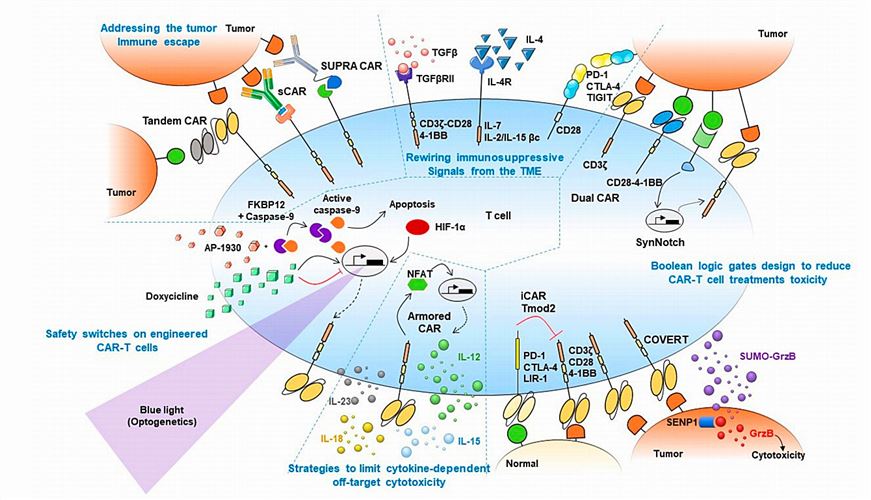Self-destruction Assays
Engineered mammalian cells have been considered a reliable and safety-relevant reality and have been broadly used in cell-based cancer immunotherapies. Serving as a leader and supplier in the biochemical market, Creative Biolabs has developed an original self-destruction assays analysis platform to capture properties of overexpressed cytokine secretion, and with sophisticated technologies, to test the efficacy of these novel immunotherapeutic strategies. We believe, with our team of experts and most up-to-date facilities, we could help you to tailor the best self-destruction cancer cells to suit the best to your cancer immunotherapy projects.
Introduction to Self-destruction and Cancer Cure
In general, the millions of normal cells in the body can get rid of unwanted or damaged cells through a self-destruct mechanism known as programmed cell death, a process that plays an important role in regulating anatomical modeling, cell development, as well as cell apoptosis. Moreover, it could also be used as a surveillance mechanism to remove cells that have been damaged by viral infections or genetic mutations.
Cancer causes excessive cell division and too little cell death in the human body, which often triggers the self-destruct process of cell apoptosis. Apoptosis may occur in normal cells, but cancer cells inhibit apoptosis by disrupting cell self-destruction signals or increasing cell survival signals, leading to an unlimited expansion of cancer cells. Therefore, inhibition of apoptosis can make cancer treatment more difficult. But recent studies have found that reactivating the apoptotic pathways of cancer cells by inhibiting cancer-related survival signals or restoring cancer-related death signals can be effective in killing cancer cells.
 Fig.1 Synthetic biology approaches to boost CAR-T cell treatment’s efficacy.1
Fig.1 Synthetic biology approaches to boost CAR-T cell treatment’s efficacy.1
Our Synthetic Gene Circuits Platform
In the past few years of studies, synthetic gene circuit approaches have become a promising tool for enhancing the efficacy of cancer immunotherapy. Normally, the rewiring of these natural cell receptor pathways, which sense the extracellular environment, can drive electrical activity that leads to therapeutic response. Synthetic circuits can sense cell intracellular and intracellular stimuli in different ways, such as G protein-coupled receptors (GPCRs) and ion channels, or an “AND” logic gate that uses cytokine receptors.
Currently, Creative Biolabs has established a panel of synthetic gene circuit approaches. These strategies show promising therapeutic potential for metabolic and infectious diseases and provide new technical support for improving the efficacy of CAR-T cells in cancer immunotherapy. In our company, GPCRs and ion channels have been successfully expressed ectopically in mammalian cells for sensing disease markers and specific therapeutic proteins. Also, TNF (tumor necrosis factor) and IL-22 (interleukin-22) receptors have been used to sense psoriasis and drive the activation of anti-inflammatory factors IL-4 and IL-10 in response.
Chief Self-destruction Assays Services
Recently, with different cancer Immunotherapies involved, a series of self-destruction assays have been generated for assisting in the evaluation of lymphangiogenesis-inducing therapies in many cancer models. Our services mainly focus on detecting the level of engineering cancer cells with different Cytokine overexpressed secretion, helping reveal the mechanism of lymphangiogenesis, analyzing naïve T cell infiltration, measuring antigen-presenting cells (APCs) subsets in the draining lymph Nodes (dLNs), assessing the T cell activation, test antigen-specific T cell response, and evaluate the self-destruction effect of modified cancer cells. For example, irradiated VEGF-C-overexpressing tumor cells have been tested by using a flow cytometry-based quantification system. The data have indicated that VEGFC-overexpressing tumor cells can provide complete prophylactic protection and long-term immune responses in preexistent tumor control. In addition, a recent study conducted in our labs has suggested VEGF-C-induced lymphangiogenesis can trigger a transformation mechanism that allows tumor cells to kill themselves, leading to the establishment of new immunotherapy strategies.
Advantages
-
Flexible, cost-effective, and time-saving serving procedure
-
A one-stop self-destruction solution for various cancer cells
-
Detailed and accurate data analysis results
Creative Biolabs offers cancer immunotherapy discovery services to help clients identify appropriate experimental protocols, ranging from design to validation, to support their drug development with different cancer models. Our platform consists of authoritative databases, a variety of engineering cancer cells for self-destruction, and much other information you may be required. For more details, please don’t hesitate to contact us.
Reference
-
Bonfá, Giuliano, et al. "Precision tools in immuno-oncology: Synthetic gene circuits for cancer immunotherapy." Vaccines 8.4 (2020): 732. Distributed under Open Access license CC BY 4.0, without modification.
For Research Use Only | Not For Clinical Use


 Fig.1 Synthetic biology approaches to boost CAR-T cell treatment’s efficacy.1
Fig.1 Synthetic biology approaches to boost CAR-T cell treatment’s efficacy.1
 Download our brochure
Download our brochure